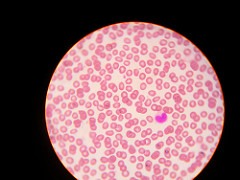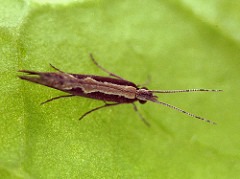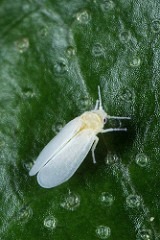
GM/Biotech Crops Report – October 2017
10th October 2017- GM/Biotech Crops Monthly Reports (BELOW) form part of BCPC’s free three-tier Biotech Crops Info service.
- This service also includes a weekly round-up of news from around the globe – see BCPC Newslink GM Crops section.
- Plus – Free access database on over 300 GM/biotech products covering 23 crops in the global market visit BCPC’s GM/Biotech Crops Manual – Register here for free access.
Already registered? Click here
GM/Biotech Crops Monthly Report October 2017
 | UK scientists edit human genome By using CRISP-R editing to turn off a gene is the simplest way to determine what it does and researchers at the Crick Institute in London are using this technique on redundant human eggs in the hope of improving IVF success. The gene they have disabled seems to be responsible for the formation of the blastocyst in the very early days of development. More Pic Source: ZEISS |
|---|---|
| Scientists engineer a super-antibody to fight HIV Some patients with HIV develop very effective antibodies to fight the disease and now a team composed of the company Sanofi and the US National Institute of Health have combined three of these effective antibodies into one treatment that seems to offer control of 99% of HIV strains. More Pic Source: AJ Cann |  |
 | CRISP-R editing used to correct human genetic disorder Beta thalassemia is a blood disorder caused by a single point mutation where ‘A’ becomes ‘G’ and a team in China have successfully edited it back to ‘A’ in diseased embryos that were not implanted. That will be the next stage. More Pic Source: Meowlody |
| A cure for male sterility Crosses between indica and japonica subspecies of rice are normally sterile but a Chinese team have used RNA interference to restore fertility. More Pic Source: Mark Usher
|  |
 | Diamondback moth trials in New York Engineered moths developed by Oxitec will be released in New York State to interact with the wild population before the onset of winter kill. The engineered moths carry a gene that prevents offspring from successfully developing in to adult moths and thus can reduce the population and thus the damage that they cause. More Pic Source: Rothamsted Research |
| Plant-derived Zika virus vaccine Scientists at Arizona State University have produced a vaccine effective against Zika virus in tobacco plants and the vaccine has been effective against microcephaly in mice. More Pic Source: Wellcome Images |  |
 | Honey bees saved by Monsanto One of the possible causes for a decline in bee populations is the Varroa mite that can be a serious parasite of bees in hives. Monsanto has developed a product that is fed to the bees in sugar syrup which silences essential genes in the mite through RNA interference. Field trials will be conducted this year (2017) throughout bee-keeping areas in North America. More Pic Source: Rob Gallop |
| Scientists shed light on photosynthesis A team from Arizona and Pennsylvania State Universities have identified what they think is the ancestral structure of the molecules that trap light to power photosynthesis. More Pic Source: Photon-de
|  |
 | Bt cabbage resists diamondback moths The Chinese Academy for Agricultural Science has successfully incorporated the Bt gene into cabbage plants and the next step is to breed this trait in to commercial varieties. More Pic Source: Via Tsuji
|
| Dwarf oat variety fights cholesterol Researchers in Australia have developed a variety of oats with high levels of beta glucans in it. Beta glucans is a natural sugar that helps prevent the reabsorption of cholesterol. The variety (Kowari) has the added benefits of higher yields and better disease resistance than current commercial varieties. More Pic Source:BGZ Olson |  |
 | Glyphosate is not an endocrine disruptor EFSA (European Food Safety Authority) has completed its review of glyphosate and concluded that there is no evidence of endocrine disruptor activity: Pic Source: Environmental Illness Network |
| There is an awful lot of mosquitoes in Brazil A new batch of 2 million GM mosquitoes is due to be released in Brazil to help reduce the population of mosquitoes that transmit Zika, Dengue and Chikungunya diseases. The effectiveness of the programme is not thought to be seen for 3 – 5 years: Pic Source: Sanofi Pasteur |  |
 | CRISPR-editing breaks the yield barrier A team at Cold Spring Harbour Laboratory have edited the tomato plant genome to generate a variety of lines with variations in fruit size, plant shape and branching architecture. By selecting appropriate traits they hope to increase the yield potential of tomatoes and claim that the technique should be applicable to all crops. More Pic Source: Photon-de
|
| EU Court sees sense An EU Court has ruled that prejudice against GMOs is not supported by scientific evidence and this must surely be a step towards embracing this technology that has been in use in other parts of the world for quite some time now. More Pic Source: Cedric Pulsney |
|
 | Whitefly-resistant lettuce Scientists have successfully bred an RNAi plasmid into lettuce that targets an ATPase enzyme in whiteflies and test have shown a mortality rate of 84-98% of whiteflies feeding on the transformed lettuce. Are the 2 – 16% that survive carrying a resistance gene? . More Pic Source: Dan Thrombs
|
THE LATEST ADDITIONS TO THE GM/BIOTECH DATABASE ARE:
- • MS11 – oilseed rape with tolerance of glufosinate granted unregulated status in America.
• DAS81418 x DAS44406 – soybean with Lepidopteran insect resistance and tolerance of glyphosate, glufosinate and 2,4-D approved for food, feed and environment use in Argentina and for food use in South Korea.
• MON87427 x MON89034 x TC1507 x MON87411 x 59122 – maize with Colepoteran and Lepidopteran insect resistance and tolerance of glyphosate and glufosinate approved for feed use in South Korea.
• New stacked event – MON87427 x MON89034 x MIR162 x MON87411 – maize with Coleopteran and Lepidopteran insect resistance and tolerance of glyphosate approved for food and feed use in South Korea
FOR INSTANT ACCESS TO GM BIOTECH MANUAL CLICK HERE (Registration required)
Already Registered? Click here to access


